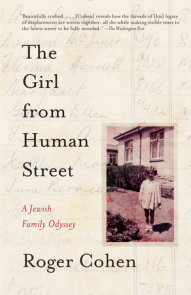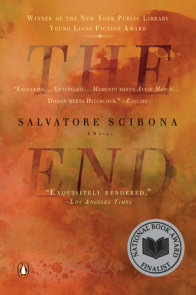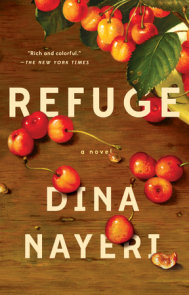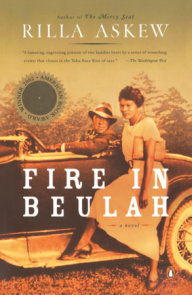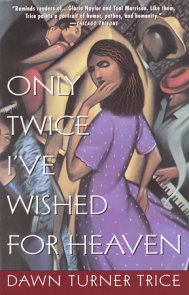READERS GUIDE
NATIONAL BESTSELLERNational Book Critics Circle Award Finalist
“Courageous. . . . Beautiful. . . . The Dew Breaker is a brilliant book, undoubtedly the best one yet by an enormously talented writer.” —The Washington Post Book World
The introduction, discussion questions, and suggestions for further reading that follow are designed to enhance your group’s discussion of The Dew Breaker, the searing new book from Edwidge Danticat, award-winning author of Breath, Eyes, Memory and Krik? Krak!
Introduction
A book that asks hard questions about truth, deception, responsibility, and redemption, The Dew Breaker is a powerful exploration of the way history, both personal and political, affects those who are swept up in its sometimes violent path. As the book opens, a young Haitian-American sculptor named Ka and her father have traveled from Brooklyn to Miami to deliver the sculpture she has made of him to a famous actress. But this tribute to her father, this permanent representation of him, brings his secret life in Haiti to the surface. As he plunges the statue into a pond, he dredges up his own submerged past. Ka’s father was a “dew breaker,” one who arrives in the early morning hours to set houses afire, to arrest and torture and kill. The horrible scar on his own face came not from an oppressor, as Ka had believed, but from one of his own victims, a minister he murdered in Haiti many years ago.The identity of that minister is the most stunning revelation in a book filled with revelations. And it is by the most skillful narrative means that Danticat holds this truth in suspension for the length of the book. From the moment of Ka’s father’s confession in the opening pages to the closing chapter’s full account of his final act of violence some thirty years earlier, Danticat explores the complex and intertwined stories of some of the people most deeply and painfully affected by the actions of the “dew breaker.” The result is a book that vividly evokes both life in Haiti under a brutal dictatorship and the experience of Haitian immigrants living in America but still in the grip of that past.
Questions and Topics for Discussion
1. Why does Danticat use multiple narrators to tell the story? How do these shifting points of view affect the way the story is told? How do they affect the way readers absorb and understand the events described in the book?
2. Why does Danticat begin The Dew Breaker with Ka’s father’s confession and then return, near the end of the book to the moment some thirty years earlier when he committed his last crime? Is this way of structuring the events more powerful than chronologically telling the story?
3. Ka says about her father, “If anyone could, [he] must have already understood that confessions do not lighten living hearts” [p. 33]. Why would he understand this better than others? Why then does he confess his secret past to his daughter? What role does guilt—his own and that of others—play in this book?
4. For her sculpture of her father, Ka chooses “a piece of mahogany that was naturally flawed, with a few superficial cracks along what was now the back. I’d thought these cracks beautiful and had made no effort to polish them away, as they seemed like the wood’s own scars, like the one my father had on his face” [p. 7]. What does this passage suggest about the differences between Ka and her father? In what ways has he tried to “polish away”
his own scars?
5. What do the stories of Eric, Michel, Dany, Nadine, Beatrice, and Freda add to the book? In what ways are their lives intertwined with Ka’s father? What effect has the “dew breaker” had on them?
6. Claude tells Dany, “I am the luckiest fucker alive,” because in killing his father, he has “done something really bad that makes me want to live my life like a fucking angel now” [p. 119]. Does The Dew Breaker seem to suggest that people can redeem themselves even after committing acts of horrific violence? How might this conversation affect Dany’s feelings about his landlord, the “dew breaker,” the man who killed his own mother and father?
7. Beatrice tells the reporter Aline, “Everything happens when it’s meant to happen” [p. 125]. Can this axiom be applied to the book itself? Do things in the book happen when they are “meant” to happen? What significant events in the unfolding of the characters’ lives seem fated?
8. How does The Dew Breaker, though a work of fiction, convey the reality of life under the Duvalier dictatorship more vividly and emotionally than a work of history or investigative journalism might?
9. Some regard the preacher’s outspoken sermons against the Duvalier dictatorship as selfish. “Not all the church members agreed with the preacher’s political line. . . . Some would even tell you, ‘If the pastor continues like this, I leave the church. He should think about his life. He should think about our lives’” [p. 186]. His own sister, Anne, wonders, “What made him think he could denounce the powerful on the radio, of all places, and not risk the safety of those he loved?” [p. 215]. Is the preacher right in speaking out against the regime, even when it puts his loved ones and his congregation in danger?
10. After the preacher wounds “the fat man,” he thinks, “at least he’d left a mark on him, a brand that he would carry for the rest of his life. Every time he looked in the mirror, he would have to confront this mark and remember him. Whenever people asked what happened to his face, he would have to tell a lie, a lie that would further remind him of the truth” [pp. 227–28]. What effect, both good and bad, does this last act of violence have on the “dew breaker”? How does it change him?
11. At the end of the book, as Anne is telling her daughter more about her father’s past, Ka hangs up, leaving Anne with a recording telling her to “hang up and try again” [p. 241]. Why has Danticat chosen to end The Dew Breaker in this open-ended way? Will Anne try again to explain her husband’s past? Will Ka ever forgive him? Should he be forgiven?
12. Why does Ka’s mother marry the “dew breaker”? Why does she stay with him after learning the truth about the identity of his last victim? What does the reconciliation between Ka’s parents—to each other, and to the truth—tell us about the nature of forgiveness, of recovery, and of healing? And how does the last section of the story told in The Dew Breaker bring us back full circle to the beginning?
13. In what ways is Ka’s father a complex character? What motivates him to join the Volunteers? How does he rationalize killing the preacher? What does he wish he could give the boy who brings him cigarettes as he’s waiting to arrest the preacher? What does he enjoy about the pain he inflicts on his prisoners? How should he be judged, finally?
About this Author
Edwidge Danticat was born in Haiti and came to the United States at the age of twelve. Her first novel, Breath, Eyes, Memory (an Oprah Book Club selection), was published when she was twenty-five, and a year later her first collection of stories, Krik? Krak!, was nominated for the National Book Award. She is also the author of the novel The Farming of Bones, which won the American Book Award, and of the nonfiction book After the Dance: A Walk Through Carnival in Jacmel, Haiti. She has written a book for young readers, Behind the Mountains, and has served as editor for The Butterfly’s Way: Voices from the Haitian Dyaspora in the United States and The Beacon Best of 2000: Great Writing by Men and Women of All Colors and Cultures.From the Hardcover edition.











